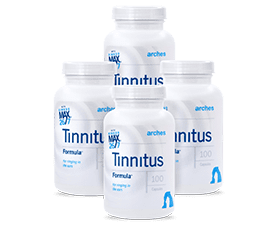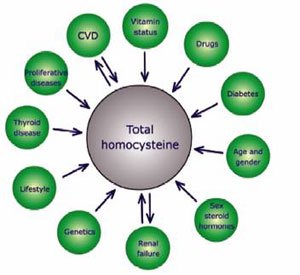By Barry Keate
Barry Keate, has lived with tinnitus over 40 years and has published 150+ research articles on numerous aspects of tinnitus. He is an expert on the condition and a well-known advocate for those with tinnitus.
High blood plasma levels of homocysteine have been linked to many major disease conditions. Cardiovascular disease, hearing loss, Alzheimer’s disease, and certain cancers and have all been shown to be powerfully affected, if not caused by high homocysteine levels. Fortunately, the easiest and most effective method of reducing homocysteine is by supplementing one’s daily diet with B vitamins and folic acid.
Homocysteine is an amino acid formed from the metabolism of the essential amino acid, methionine. High dietary consumption of methionine, which can be found in meats and dairy products, can result in the overproduction of homocysteine. Failure to metabolize homocysteine with folic acid, vitamin B-6 and vitamin B-12 leads to unhealthy elevated blood plasma levels. Homocysteine levels can be checked with a simple blood test performed at doctor’s offices and hospitals.
In order to appreciate fully how homocysteine levels affect hearing loss and tinnitus, it is important to understand the initial research conducted on homocysteine levels and their prevalence in both heart attack and stoke due to blood clots.
Cardiovascular Disease
Since at least the 1950s the dominant view of arteriosclerotic cardiovascular disease has been that it is mainly the outcome of a lifelong diet rich in animal fats, particularly cholesterol. Arteriosclerosis is what we commonly refer to as “hardening of the arteries”. This theory holds that cholesterol, especially the low-density-lipoprotein (LDL) variety, collects in plaques that line the insides of the large and small arteries. In time the plaques, or the clots they cause, impede blood flow to the heart, brain and arteries. The consequences are heart attacks, strokes and crippling peripheral vascular disease.
 However, a wealth of research since then shows that while this may be part of the problem, it is not the full explanation. In 1968, Kilmer McCully, MD, a professor at Harvard and pathologist at Massachusetts General Hospital, encountered two children with a genetic disorder called homocystinuria. In this disorder homocysteine, an amino acid formed from methionine, is present in the blood in excessive amounts. One of these children, a boy only 2 months old, had an advanced stage of arteriosclerosis that resembled that seen in older adults with cardiovascular disease. An 8 year old child with the same genetic disorder had died previously of a stroke. An autopsy showed the child’s arteries looked exactly like those of elderly men with arteriosclerosis.
However, a wealth of research since then shows that while this may be part of the problem, it is not the full explanation. In 1968, Kilmer McCully, MD, a professor at Harvard and pathologist at Massachusetts General Hospital, encountered two children with a genetic disorder called homocystinuria. In this disorder homocysteine, an amino acid formed from methionine, is present in the blood in excessive amounts. One of these children, a boy only 2 months old, had an advanced stage of arteriosclerosis that resembled that seen in older adults with cardiovascular disease. An 8 year old child with the same genetic disorder had died previously of a stroke. An autopsy showed the child’s arteries looked exactly like those of elderly men with arteriosclerosis.
It occurred to Dr. McCully that the primary pathology of cardiovascular disease is a fibrotic change in the inner arterial lining that literally produces hardening of the arteries. Plaque build-up comes later and only if initial damage has already occurred. This led to a fundamental shift in the known pathology of cardiovascular disease; that cholesterol and clogged arteries are not the causes but rather the symptoms of heart disease. Dr. McCully presented his finding in a paper published in the American Journal of Pathology in 1969. [1]
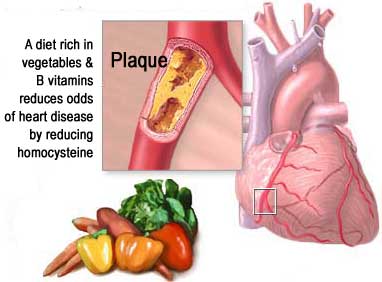
Since these preliminary observations, it has become clear that elevated homocysteine levels are associated with coronary disease risk in adults. Homocysteine causes arterial injury, increases oxidation of LDL cholesterol particles (thereby making them more damaging), constricts arteries and promotes blood clot formation. The net result is a threefold increase in heart attack and stroke risk. Many people with heart disease have elevated homocysteine levels. [2]
The clear message from recent scientific findings is that there is no safe “normal range” for homocysteine. Commercial laboratories state that normal homocysteine can range from 5 to 15 micro moles (units of molecular weight) per liter of blood. Research data reveals that homocysteine levels above 6.3 can cause a steep progressive risk of heart attack. [3] One study found each 3-unit increase in homocysteine caused a 35% increase in heart attack. [4]
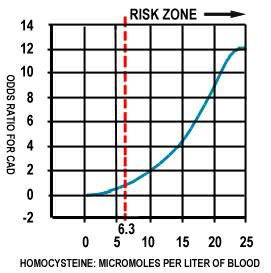 |
The chart to the left illustrates research that incremental increases in homocysteine levels correlate with increased risk for coronary artery disease. Levels of risk: 15.0=high risk; 9.0=moderate risk; 7.0=low risk.
|
In 1997, Dr. McCully published his book The Homocysteine Revolution; in 1998 he received the Linus Pauling Functional Medicine Award and in 1999 he received the Burton Kallman Science Award from the National Nutritional Foods Association.
Methionine is an essential amino acid found in plant and animal proteins. It is necessary for the breakdown of fats, assists with the digestive system and in energy production. When methionine is metabolized, one of the products formed is homocysteine. Homocysteine is further metabolized by either remethylation, a process requiring vitamin B-12 and folic acid, or by a transulfuration pathway that involves vitamin B-6. Normally homocysteine is rapidly metabolized, keeping it from building up in the circulation.
However, animal proteins found in meats, poultry and dairy products contain up to three times the methionine as plant protein, creating much more homocysteine than the body can metabolize. It is this excess homocysteine that causes tissue damage.
As mentioned above, folic acid, vitamin B-12 and vitamin B-6 are necessary to metabolize excess homocysteine. These vitamins are easily destroyed when foods are heated or refined. Many people in the western world, who consume a diet high in refined and pre-packaged foods, are deficient in these vitamins. Combining this with a diet high in animal fat causes damaging high homocysteine levels.
Dietary studies support a correlation between homocysteine levels and intake of these nutrients. A study of nearly 1,200 elderly persons showed that the lower the blood plasma levels of vitamins B-6, B-12 and folic acid, the higher the blood homocysteine level. [5] Populations with high rates of cardiovascular disease are the same ones whose diet typically includes processed foods containing little of these vital micronutrients.
 Joseph Knight, MD, professor of pathology at the University of Utah School of Medicine in Salt Lake City, acknowledges Dr. McCully’s “beautiful work” in the field and goes on to say that “the nice thing about homocysteine is that it’s manipulable in most individuals, because if they increase their intake of folic acid, vitamin B-6 and vitamin B-12, this will decrease the level and remove, for most people, that risk factor.”
Joseph Knight, MD, professor of pathology at the University of Utah School of Medicine in Salt Lake City, acknowledges Dr. McCully’s “beautiful work” in the field and goes on to say that “the nice thing about homocysteine is that it’s manipulable in most individuals, because if they increase their intake of folic acid, vitamin B-6 and vitamin B-12, this will decrease the level and remove, for most people, that risk factor.”
In the past few years, reports of several treatment trials indicate that vitamin B supplements reduce the risk for cardiovascular disease and stroke. Patients with homocysteine levels higher than 14 micro moles per liter and expanding plaques in their carotid arteries had an actual decrease in plaque after they started daily supplements of folic acid, B-6 and B-12. [6] Women followed up for 14 years who had the highest intake of folate and B-6 were only about half as likely as those with the lowest intakes to have a heart attack, fatal or otherwise. [7]
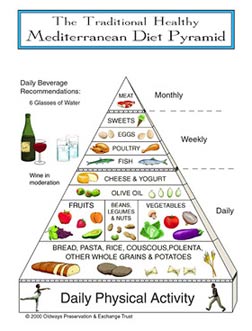 Everyone’s daily diet should be rich in fresh fruits, vegetables, grains and cereals. The USDA recommends 2-4 servings of fruit, 3-5 servings of vegetables (a major source of folic acid), and 6-11 servings of breads, cereals, rice, or pasta daily. Processed and refined foods should be kept to a minimum. For many people the daily intake of 800 micrograms (mcg) of folic acid, 1,000 mcg of vitamin B-12 and 100 mg of vitamin B-6 will keep homocysteine levels in a safe range.
Everyone’s daily diet should be rich in fresh fruits, vegetables, grains and cereals. The USDA recommends 2-4 servings of fruit, 3-5 servings of vegetables (a major source of folic acid), and 6-11 servings of breads, cereals, rice, or pasta daily. Processed and refined foods should be kept to a minimum. For many people the daily intake of 800 micrograms (mcg) of folic acid, 1,000 mcg of vitamin B-12 and 100 mg of vitamin B-6 will keep homocysteine levels in a safe range.
Editorial note:
I find it disturbing that the American medical establishment considers cholesterol to be the primary cause of cardiovascular disease rather than a symptom. Treatment for high cholesterol involves the use of statin drugs, such as Lipitor, which are very expensive and come with significant side effects. The statin drug class is the largest and most profitable of all prescription medications, costing $22 billion per year in the US. This represents 8% of the total American drug cost of $270 billion. [8] A more sensible approach would be dietary and exercise instruction and supplemental B vitamins to reduce homocysteine, followed by statin drugs, only when necessary.
Hearing Loss and Tinnitus
Recent clinical trials have focused on causes for sudden sensorineural hearing loss (SSHL). Hearing loss, whether SSHL, noise-induced, is the primary contributor to tinnitus. There has been a significant increase in recent years in the diagnosis of SSHL in western countries with an incidence of 20 in 100,000 people affected every year. Thrombophilia (a predisposition to increased clotting) is increasingly understood to play a role in vascular accidents, which can effect cochlear perfusion. A study of 45 consecutive SSHL patients and 135 healthy controls found that the SSHL patients had higher homocysteine levels and lower folate levels than the healthy controls. A growing body of evidence suggests that folic acid and B vitamins can lower homocysteine levels and thereby decrease the likelihood of experiencing thromobotic events and SSHL. [9]
Another recent study on SSHL aimed to investigate the causes of thromobotic risk factors. The authors found an independent association between SSHL and high homocysteine levels. The results revealed a possible therapeutic target, as high homocysteine may be reduced by taking folic acid, vitamin B-6 and vitamin B-12. [10]
There is very recent evidence that folic acid can slow hearing loss. A study published in 2007 looked at 728 Dutch men and women aged 50 to 70. The participants all had high homocysteine levels. Half the participants got strong folic acid supplements, 800 mcg per day, for three years. The rest received a placebo. At the end of three years those who received the folic acid supplements had less low-frequency hearing loss than the placebo recipients. The difference was less than 1 dB however the study commentary made the statement that you would expect a 5 dB reduction in hearing loss over a 20 year period. They also suggested that folic acid should always be combined with vitamin B-12 because they work together and giving a large dose of one would produce a deficiency in the other. [11]
An Israeli study of 113 army personnel exposed to military noise showed a significant relationship between noise-induced hearing loss and vitamin B-12 deficiency. Patients with tinnitus and noise-induced hearing loss exhibited vitamin B-12 deficiency in 47% of cases compared with normal subjects who exhibited B-12 deficiency in 19%. Some improvement in tinnitus was observed in 12 patients following vitamin B-12 replacement therapy. [12]
Folic acid supplementation has been prescribed for many years for pregnant women to reduce the risk of neural tube defects. There is now strong evidence that this supplement, combined with vitamins B-6 and B-12 can reduce homocysteine levels, cardiac and cancer risk, dementia and hearing loss. Folic acid is found in green leafy vegetables such as spinach, kale, chard and broccoli.
Alzheimer’s Disease and Cancer
Elevated homocysteine levels may contribute to cognitive decline and Alzheimer’s disease. [13] In healthy older adults, high homocysteine was associated with poorer cognitive function and faster cognitive decline over the course of five years.[14] Although scientists do not know whether homocysteine causes cognitive decline or Alzheimer’s, they have noted that high homocysteine correlates with the progression and severity of these conditions.
Homocysteine may increase the risk for cervical cancer. Researchers found that women with elevated homocysteine levels were two to three times more likely to have invasive cervical cancer. [15]
Higher homocysteine levels had a higher risk of colorectal cancer in women. Women with the highest homocysteine levels had a more than 70% higher colorectal cancer risk than those with the lowest levels. This led scientists to suggest that vitamin supplementation strategies to lower homocysteine levels might also decrease colon cancer risk. [16]
Conclusion
Arches Tinnitus Stress Formula™ and Arches Tinnitus B-12 Formula™ contain all the B vitamins necessary to reduce homocysteine levels. The Stress Formula contains 100 mg of vitamin B-6 and 400 mcg of folic acid. The B-12 Formula contains 1,000 mcg of vitamin B-12 (as methylcobalamin, the most active form) and 400 mcg of folic acid. Combining the two provides 1,000 mcg of B-12, 100 mg of B-6 and 800 mcg of folic acid. There are many other benefits, including reduced tinnitus, from taking the full spectrum of B vitamins.
The ease of accessibility, the low cost, and the prospect of a marked reduction of homocysteine levels make B-Vitamin supplementation a simple choice. Arches is offering a special discount to our readers who wish add B complex and B-12 to their daily regimen.
References:
- 1 – McCully KS. Vascular pathology of homocysteinemia: implications for the pathogenesis of arteriosclerosis. Am J Pathol, 1969 Jul;56(1):111-28.
- 2 – Refsum H, Ueland PM, Nygard O, Vollset SE. Homocysteine and cardiovascular disease. Annu Rev Med. 1998;49:31-62.
- 3 – American Heart Association, Circulation, Nov 15, 1995, pp 2825-2830.
- 4 – American Journal of Epidemiology, 1996; vol 143, no. 9 845-859.
- 5 – Selhab J, Jacques PF, Wilson PWF, Vitamin status and intake as primary determinants of homocysteinemia in an elderly population. JAMA. 1993:270:2693-2698.
- 6 – Peterson JC, Spence JD. Vitamins and progression of atherosclereosis in hyper-homocyt(e)inaemia. Lancet. 1998;351:263.
- 7 – Rimm EB, Willett WC, Hu FB, et al. Folate and vitamin B6 from diet and supplements in relation to risk of coronary heart disease among women. JAMA. 1998;279:359-364.
- 8 – New York Times, Saturday, November 3, 2007 p. A1.
- 9 – Hall J. Sudden hearing loss and folic acid. Journal Watch Pediatrics and Adolescent Medicine June 13, 2005.
- 10 – Marcuccu R, Liotta A, Cellai AP, et al. Cardiovascular and thrombophilic risk factors for idiopathic sudden sensorineural hearing loss. Journal of Thrombosis and Haemostasis, 1995(3):929-934.
- 11 – Durga J, Verhoef P, Anteunis JC, et al. Effects of folic acid supplementation on hearing in older adults. Annals of Internal Medicine Jan 2, 2007, 146(1);1-9.
- 12 – Shemesh Z, Attias J, Ornan M, et al. Vitamin B-12 deficiency in patients with chronic tinnitus and noise induced hearing loss. Am Otolaryngol 1993 Mar-Apr;14(2):94-99.
- 13 – Postiglione A, Milan G, Ruocco A. et al. Plasma folate, vitamin B-12, and total homocysteine and hopmozygosity for the C677T mutation of the 5, 10-methylene tetrahydrofolate reductase gene in patients with Alzheimer’s dementia. A case-control study. Gerontology. 2001 Nov;47(6):324-9.
- 14 – McCaddon A, Hudson P, Davies G, et al. Homocysteine and cognitive decline in healthy elderly. Dement Geriatr Cogn Disord. 2001 Sep;12(5):309-13.
- 15 – Weinstein SJ, Ziegler RG, Selhub J, et al. Elevated serum homocysteine levels and increased risk of invasive cervical cancer in US women. Cancer Causes Control. 2001 May;12(4):317-24.
- 16 – Kato I, Dnistrian AM, Schwartz M, et al. Serum
Get Free Shipping!
Order now and get free shipping on either the Tinnitus Starter Kit or Combo Pack. Try the doctor recommended products with clinically proven ingredients for tinnitus. No coupon code required.
